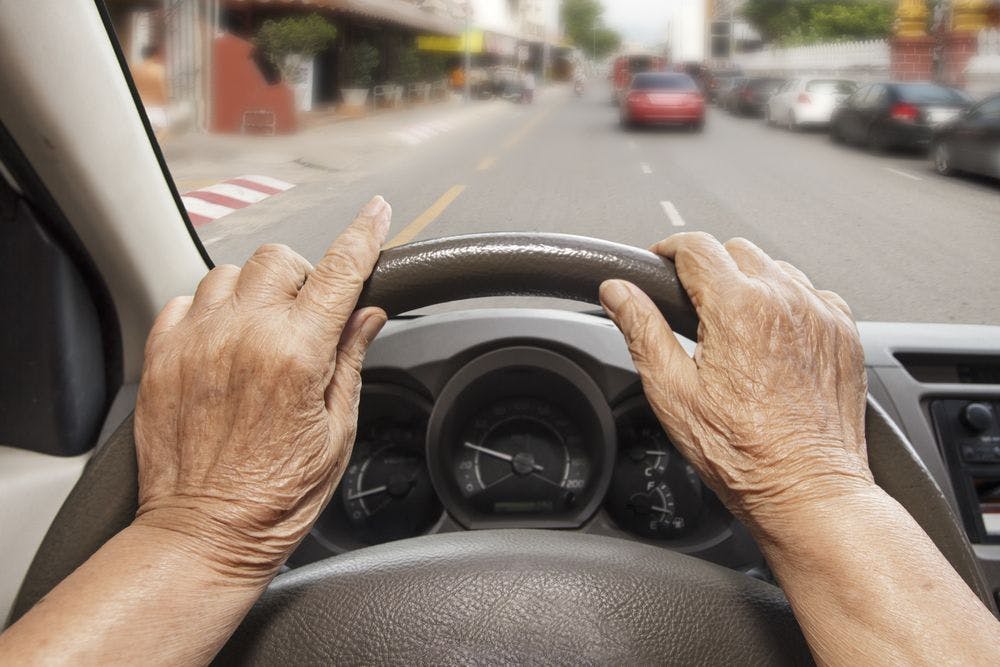Over 70s Driving Licence Shake Up | What’s Changed?

Estimated Reading Time: 9 minutes
In the UK, once you reach 70 years of age, you need to renew your driving licence and every three years after.
A driving licence shake-up for over 70s means certain medical conditions need reporting to the DVLA when making this renewal (such as epilepsy, eye conditions and fainting), as these are more likely to class you as unfit to drive.
In this article, we’ve explained which medical conditions need declaring to the DVLA and the process of making a medical declaration.
Where would you like to live?
Browse the best retirement homes near you through Lottie.
In this article:
- Over 70s driving licence shake-up and restrictions
- The full list of medical conditions you may need to declare
- Should you stop driving if you have a medical condition?
- Renewing your driving licence
- Making a medical declaration
- What happens next?
Over 70s Driving Licence Shake-Up and Restrictions
In the UK, people are now required to renew their driving licence when turning 70. This applies to everyone who drives a car, motorbike or a different kind of light vehicle. Once you’ve turned 70, you’ll need to renew your licence every three years.
While people aged 70 and over can apply to have their licence renewed, some people may not have their renewal granted, due to being deemed unfit or unsafe to drive.
It’s really important you’re safe to drive, which is why you shouldn’t continue driving if you have a physical or mental health condition you think could affect your driving. A medical professional such as a doctor may have expressed similar concerns as well.
When renewing your licence, you need to let the DVLA know of any medical conditions you have which may affect your ability to safely drive.
Not reporting a medical condition could lead to a fine of up to £1,000 or even having your vehicle seized.
What else is being discussed?
The DVLA and Driving Mobility are discussing a proposal which would see older adults have a tracking device installed on their vehicles as part of a ‘graduated driving licence’ scheme.
This would restrict older adults with certain health conditions from driving within a 20 or 30-mile radius of their home, along with a night-time ban on driving in some cases.
The Full List of Medical Conditions You May Need to Declare
Below, we’ve provided a full list of medical conditions you may need to report to the DVLA.
| Medical Conditions (A-E) | ||||
|---|---|---|---|---|
| Absence seizures | Acoustic neuroma | Addison’s disease | Agoraphobia | AIDS |
| Alcohol problems | Alzheimer’s disease | Amaurosis fugax | Amputations | Amyotrophic Lateral Sclerosis (ALS) |
| Angina | Angioma | Angioplasty | Ankylosing spondylitis | Anorexia nervosa |
| Anxiety | Aortic aneurysm | Arachnoid cyst | Arrhythmia | Atrial defibrillator |
| Arteriovenous malformation | Artery occlusion | Arthritis | Asperger syndrome | Asteroid hyalosis |
| Astigmatism | Ataxia | Attention deficit hyperactivity disorder (ADHD) | Autistic spectrum condition | |
| Balloon angioplasty (leg) | Behçet’s disease | Best’s disease | Bilateral artery occlusion (retinal) | Bipolar disorder |
| Blackouts | Blepharitis | Blepharospasm | Blood clots | Blood pressure |
| Brachial plexus injury | Brain abscess, cyst or encephalitis | Brain aneurysm | Brain angioma | Brain haemorrhage |
| Brain injury (traumatic) | Brain tumours | Branch retinal vein occlusion | Broken limbs | Brugada syndrome |
| Burr hole surgery | ||||
| Caesarean section | Cancer | Catheter ablation | Cardiac problems | Carotid artery stenosis |
| Cataplexy | Central vein occlusion | Central venous thrombosis | Cerebral palsy | Chalazion |
| Charcot-Marie-Tooth disease | Chiari malformation | Choroidal infarction | Choroidal neovascular | Choroiditis |
| Chronic aortic dissection | Chronic central serous retinopathy | Coats’ disease | Cogan’s dystrophy | Cognitive problems |
| Colour blindness | Computer vision syndrome | Congenital heart disease | Conjunctivitis | Convulsions |
| Corneal abrasion | Corneal degeneration | Corneal transplant | Corneal ulcer | Coronary artery bypass or disease |
| Coronary angioplasty | Corrective laser treatment | Cosmetic eye surgery | Cranial arteritis | Cranial nerve palsy (with double vision) |
| Cranial nerve palsy (without double vision) | Cystic fibrosis | Cystic prolactinoma | ||
| Dacryocystitis | Deafness | Defibrillator | Déjà vu | Dementia |
| Dendritic ulcer (corneal ulcer) | Depression | Detached retina | Diabetes | Diabetic retinopathy (no laser treatment) |
| Diabetic retinopathy (with laser treatment) | Dilated cardiomyopathy | Diplopia (double vision) | Dizziness | Drug misuse |
| Dry eye | ||||
| Eating disorders | Ectropion (outward eyelid) | Empyema (brain) | Entropion (inward eyelid) | Epilepsy |
| Episcleritis | Essential tremor | Exophthalmos | Eye tumour |
We can help you find the perfect UK retirement home. Use our free service to filter by location, price, the facilities available, purchase type and more!
| Medical Conditions (F-K) | ||||
|---|---|---|---|---|
| Fainting | Farsightedness | Fits | Flashers/floaters (in eye) | Foreign body (in eye) |
| Fractured skull | Friedreich’s ataxia | Fuchs’ dystrophy | ||
| Glaucoma | Global amnesia | Grand mal seizures | Guillain-Barré syndrome | |
| Head injury | Heart attack | Heart arrhythmia | Heart failure | Heart murmurs |
| Heart palpitations | Heart valve disease or replacement valve | Hemianopia | Herpes simplex keratitis | Herpes zoster ophthalmicus |
| High blood pressure | HIV | Hodgkin’s lymphoma | Horner’s syndrome | Huntington’s disease |
| Hydrocephalus | Hypertension | Hypertrophic cardiomyopathy | Hypoglycaemia | Hypoxic brain damage |
| Hysterectomy | ||||
| Implantable cardioverter defibrillator (ICD) | Intracerebral haemorrhage | Iris neovascular (Rubeosis) | Iritis | Ischaemic heart disease |
| Keratoconus | Kidney dialysis | Kidney problems | Korsakoff’s syndrome |
| Medical Conditions (L-P) | ||||
|---|---|---|---|---|
| Labyrinthitis | Lazy eye (without double vision) | Learning difficulties | Leber’s optic atrophy | Left bundle branch block |
| Leukaemia | Lewy body dementia | Limb disability | Long QT syndrome | Longsightedness |
| Loss of an eye | Low blood sugar | Lumboperitoneal shunt | Lung cancer | Lymphoma |
| Macroprolactinoma | Macular cyst | Macular hole | Macular oedema | Malignant brain tumours |
| Malignant melanoma | Manic depressive psychosis | Marfan’s syndrome | Medulloblastoma | Melanoma (ocular) |
| Memory problems (severe) | Meningioma | Mini-stroke | Monocular vision | Monocularity myopia (shortsightedness) |
| Motor neurone disease | Multiple sclerosis | Muscular dystrophy | Myasthenia gravis | Myocardial infarction |
| Myoclonus | ||||
| Narcolepsy | Neovascularisation of the cornea | Neovascularistion of the optic nerve head | Night blindness | Nystagmus |
| Obsessive compulsive disorder | Obstructive sleep apnoea | Ocular albinism | Ocular histoplasmosis | Ocular myasthenia gravis (with double vision) |
| Ocular myasthenia gravis (without double vision) | Ocular rosacea | Ophthalmoplegia (with double vision) | Ophthalmoplegia (without double vision) | Optic atrophy |
| Optic neuritis | ||||
| Pacemakers | Palpitations | Paranoia | Paranoid schizophrenia | Paraplegia |
| Parkinson’s disease | Peripapillary nevus | Peripheral arterial disease | Peripheral neuropathy | Personality disorder |
| Petit mal seizures | Pinguecula | Pink eye (conjunctivitis) | Pituitary tumour | Posner Schlossman syndrome |
| Post traumatic stress disorder (PTSD) | Posterior vitreous detachment | Presbyopia | Proptosis | Psychosis |
| Psychotic depression | Pterygium | Ptosis | Pulmonary arterial hypertension |
| Medical Conditions (Q-U) | ||||
|---|---|---|---|---|
| Quadrantanopia | ||||
| Recurrent corneal erosion | Red eyes | Reis Bucklers corneal dystrophy | Renal dialysis | Retinal artery fugax |
| Retinal artery thrombosis | Retinal occlusion (artery or vein) | Retinal tear or detachment | Retinal vein thrombosis | Retinoblastoma |
| Retinopathy (with laser treatment) | Retinopathy fibroplasia | Retinopathy of prematurity | Retrobulbar neuritis | Rubeosis (1 or 2 eyes) |
| Schizo-affective disorder | Schizophrenia | Scotoma | Seizures | Severe communication disorders |
| Severe depression | Shortsightedness (myopia) | Sight in one eye only | Sjogren’s lupus syndrome | Sleep apnoea |
| Sleepiness (excessive) | Spinal problems and injuries | Stargardt’s (juvenile macular degeneration) | Stroke | Stye |
| Subarachnoid haemorrhage | Subconjunctival haemorrhage | Surgery | Syncope | |
| Tachycardia | Temporal lobe epilepsy | Thyroid related orbitopathy | Tonic clonic fits | Toxoplasma retinitis (toxoplasmosis) |
| Tourette’s syndrome | Transient global amnesia | Transient ischaemic attack | Tunnel vision | |
| Usher syndrome |
| Medical Conditions (V-Z) | ||||
|---|---|---|---|---|
| Valve disease or replacement valve | Vein occlusion | Ventricular defibrillator | Vertigo | Vision in one eye only |
| Visual acuity (reduced) | Vitreous detachment | Vitreous haemorrhage | VP shunts | |
| Wolff-Parkinson-White syndrome | ||||
| Xanthelasma |
For further information or advice surrounding any of these conditions, check out the GOV.UK A-Z guide on health conditions that may affect your driving.
Through the above link, you can click on a specific condition to check whether or not you need to tell the DVLA about it.
Should You Stop Driving If You Have a Medical Condition?
If any of the following apply, you must give up your licence:
- Your doctor tells you to stop driving for at least three months
- You have a medical condition which affects your ability to drive safely and this condition has lasted for at least three months
- You don’t meet the necessary driving standards because of your medical condition
While you’ll need to disclose any medical condition to the DVLA and your insurer in the majority of cases, not all medical conditions will prevent you from being able to drive safely.
Renewing Your Driving Licence
The easiest way to renew your driving licence is online, using GOV.UK. This applies to people in England, Scotland and Wales.
You can also apply by post. The DVLA will send you a D46P application form before you need to renew.
In Northern Ireland, you can apply online through NI Direct.
Making a Medical Declaration
When completing the D46P application form to get a new licence, you’ll be asked to declare any medical conditions. You’ll also be asked whether you meet the eyesight standards for driving.
It’s really important to be completely honest here. Otherwise, you could face a fine.
You should also declare any health condition to your insurers that you’ve told the DVLA about. Not doing so could invalidate your insurance policy.
We’d recommend having a medical check before you renew your licence at 70, and every time you renew your licence after that point.
What Happens Next?
After you’ve told the DVLA about your condition, there are a few things they could do next:
- They may make an immediate decision based on the information you’ve given (either accepting or rejecting your application for renewal)
- They could contact your GP or a different consultant to help form an opinion. They’ll only make this contact with your permission. They may also arrange for a local medical professional to examine you
- They may ask you to undergo a driving assessment, appraisal or eyesight test before making a final decision as to whether your renewal application will be approved or not
If it’s a no and you’ve been deemed unfit to continue driving, you’ll have to give up your driving licence.
We’re on a mission to support individuals and their loved ones throughout each stage of their later living journey. For more information, check out everything Lottie has to offer.
Frequently Asked Questions
Do doctors inform the DVLA of medical conditions?
Drivers are legally required to let the DVLA know about any medical conditions which could affect their driving ability. While doctors usually won’t directly contact the DVLA, they will tell their patients about conditions they think might affect their ability to drive.
What form do I need to report a medical condition to the DVLA?
The easiest way to report a medical condition to the DVLA is through GOV.UK. Using their A to Z list of conditions, you can check for guidance on an individual condition. If they recommend you report your condition, there will be a link to do so. A variety of forms are available, depending on your condition and the type of vehicle you drive.
Do you need to have a medical to renew your driving licence at 70?
While you don’t have to get a medical to renew your driving licence, having a medical check beforehand makes sense. You should then continue to do this each time your licence needs renewing.
What medical conditions need to be declared for car insurance?
A car insurance quote is affected by how safe a driver you are. Therefore, if you have a medical condition which could make you less safe of a driver, both your insurer and the DVLA need to be told about this.



